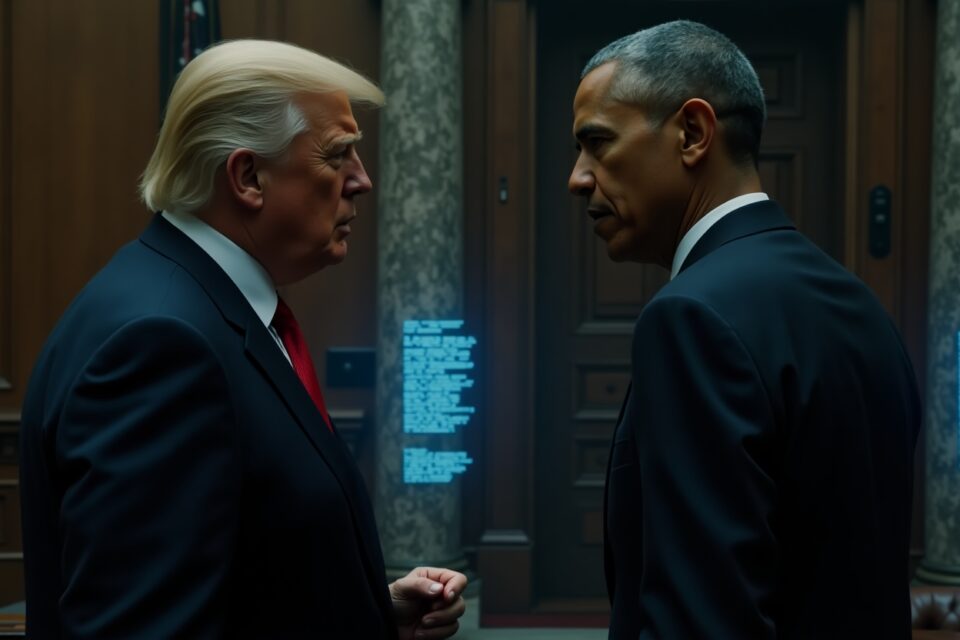What No One Tells You About AI in Politics: The Controversial Trump Video
AI in politics is making headlines like never before. It feels like just yesterday AI was confined to the realm of tech enthusiasts, but now, it’s weaving its way into the core of political discourse. One story that has everyone talking is the controversial AI-generated video showing former President Donald Trump’s fantastical portrayal of Barack Obama being arrested in the Oval Office. If that’s not enough to make you pause and consider the power of AI, I don’t know what is.
This shift is not just about a quirky piece of digital content; it’s about the very fabric of how political narratives are crafted and consumed today. As AI continues to infiltrate politics, we’re left to ponder its potential to sway public perception, either subtly or dazzlingly, leaving us all a bit uneasy about what is real.
——————–
Let’s shift gears and talk about that infamous Trump video. Imagine the scene: Barack Obama, typically poised and commanding, suddenly finds himself being led away in handcuffs in the very room he once commandeered—the Oval Office. It sounds like a plot twist out of a political thriller, but instead, it’s an AI creation that has sparked quite the uproar.
The video surfaced online, spreading rapidly across various platforms. Rather than being dismissed as a tasteless spoof, it ignited significant debate among political figures and media alike. Trump himself playfully labeled the video \”hilarious\” and \”satirical,\” yet, beneath the humor, it’s a clear demonstration of the power of deepfake technology—a tool with the potential to either entertain or disorient, depending on how it’s wielded.
In this case, the video isn’t just a one-off gimmick. It’s part of a broader conversation about how AI is used in creating content that can manipulate media narratives and shape public perception (Daily Kos).
——————–
AI’s influence in political debate is no longer a futuristic concept—it’s already here. We’ve entered an era where AI-generated content, like deepfakes, can seamlessly blend fiction with reality in ways that are inspiring, troubling, or both. An analogy that comes to mind is with photo manipulation; back in the day, photos were ‘tweaked’ in dark rooms, but now with AI, the entire screenplay can be fabricated.
According to some experts, including New York Times analysts, the ability to create convincing false narratives so easily poses a direct threat to authentic discourse. And it makes you wonder: how many of these videos will flood our screens during the next election cycle?
For instance, deepfake concerns were heightened when this satirical Trump video began circulating, with some politicians and media outlets calling for stricter guidelines around the technology. There’s a palpable fear that such tools could twist future political debates, leading to a slippery slope of distrust in what we see and hear.
——————–
So, what’s the takeaway? AI in politics can manipulate media to manipulate us. The distrust stems from the stark realization that if what we see and hear can’t be trusted, the fundamentals of democracy—relied upon for transparency and truth—are shifted. Experts warn this could even lead to an erosion of trust in genuine news (Washington Post).
Consider the impact on voters: a deepfake could unfairly sway opinions, alter political landscapes, and undermine electoral processes. It’s not just about one video or one politician; it’s about a new realm of influence where truth and deceit walk a razor-thin line.
——————–
Looking ahead, we’re left speculating about the future of AI influence in politics. Will regulations emerge to keep things on a moral track, or will it be a free-for-all? It’s clear that ethics will play a significant role, particularly as we grapple with AI’s growing ability to subvert reality.
The prediction is that a push for regulations will gather momentum, as there is already concern about AI ushering in an era of political chaos if left unchecked. Imagine a world where every political debate is suspect due to potential AI tampering. Could AI technology redefine campaigns, debates, and the essence of political engagement? Definitely. But the roadmap is uncertain.
——————–
I’m curious to hear your take. What do you think about the use of AI in politics, especially regarding the controversial Trump video? This topic is more than just a tech discussion; it affects how we perceive and interact with the world. Drop a comment below or share this article on social media to get the conversation going. Let’s delve into what it means for our future—and how we might steer the course responsibly.
